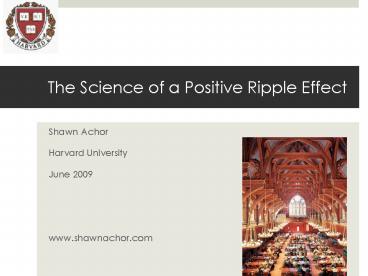The Science of a Positive Ripple Effect - PowerPoint PPT Presentation
1 / 24
Title:
The Science of a Positive Ripple Effect
Description:
24% are unaware if they are currently in a romantic relationship. Self-Belief ... Journaling (Slatcher & Pennebaker, 2006) Exercise (Babyak et al., 2000) ... – PowerPoint PPT presentation
Number of Views:54
Avg rating:3.0/5.0
Title: The Science of a Positive Ripple Effect
1
The Science of a Positive Ripple Effect
- Shawn Achor
- Harvard University
- June 2009
- www.shawnachor.com
2
Introducing the Outlier
- Studying the Identified Positive Outliers (IPOs)
3
Ripple Effects and Mirror Neurons
- Positive individual changes ripple to culture
change
4
Case study Studying Outliers
5
(No Transcript)
6
(No Transcript)
7
Harvard University
8
The Great Divide
- 80 report work debilitating depression
- GPA not correlate with happiness
- 35 Highest ranking officer
- Average of romantic relationships lt 1
- 24 are unaware if they are currently in a
romantic relationship
9
Self-Belief
- Learn to Fail or Fail to Learn (Tal Ben-Shahar,
2006) - Punished by Praise (Dweck, 2003)
10
Positive Brains and Success
- The Silent 75
- Positivity and Performance
- (Hom and Arbuckle, 1988)
- Happiness and Intelligence
- (Estrada, Isen and Young, 1997)
11
Strategy 1Training Your Brain
- The Tetris Effect
- Gratitude training
12
Strategy 2 Managing Activation Energy
- Long email addresses and guitars
- Activation energy
- Flow
- (Csikszentmihalyi, 1990)
13
Happiness, Meaning and Potential
- Shawn Achor
- Harvard University
- www.shawnachor.com
- shawnachor_at_gmail.com
14
Practicing Happiness
- Creating lasting positive change
- 3 Gratitudes (Emmons McCullough, 2003)
- Journaling (Slatcher Pennebaker, 2006)
- Exercise (Babyak et al., 2000)
- Meditation (Allen, 2003 Pettinger, 2007)
- Random Acts of Kindness (Lyubomirsky, 2005)
15
Positive Relativity Theory (Achor, 2008)
- To what are we motivated to attend?
- How we engage affects perception (Achor, 2007)
- Perception predicts performance and resilience
(Proffit and Clore, 2008)
16
Engaged Brains and Relativity Theory
17
Our Brains During Stress
18
The 3 Million Brain Hijack
19
Eustress vs. Distress
20
The Soprano Effect (Achor, 2007)
- Reflexive brain on high alert
- Chronic activation of the sympathetic nervous
system
21
How to Prevent a Hijack
- Locus of control predicts response to stress
(Rahim Psenicka, 1996) - Gaining control
- 1. Self-awareness
- 2. Use your words
- 3. Separate internal from external control
22
The Pygmalion Effect (Rosenthal, 1968)
23
Emotional Contagion
- Stuart Smalley
- Florida
- Gray
- Orange
- Bingo
24
Conclusion Group Engagement































